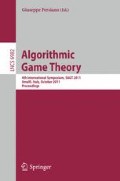Abstract
We study problems of scheduling jobs on related machines so as to minimize the makespan in the setting where machines are strategic agents. In this problem, each job j has a length l j and each machine i has a private speed t i . The running time of job j on machine i is t i l j . We seek a mechanism that obtains speed bids of machines and then assign jobs and payments to machines so that the machines have incentive to report true speeds and the allocation and payments are also envy-free. We show that
-
1
A deterministic envy-free, truthful, individually rational, and anonymous mechanism cannot approximate the makespan strictly better than 2 − 1/m, where m is the number of machines. This result contrasts with prior work giving a deterministic PTAS for envy-free anonymous assignment and a distinct deterministic PTAS for truthful anonymous mechanism.
-
2
For two machines of different speeds, the unique deterministic scalable allocation of any envy-free, truthful, individually rational, and anonymous mechanism is to allocate all jobs to the quickest machine. This allocation is the same as that of the VCG mechanism, yielding a 2-approximation to the minimum makespan.
-
3
No payments can make any of the prior published monotone and locally efficient allocations that yield better than an m-approximation for Q||C max [1,3,5,9,13] a truthful, envy-free, individually rational, and anonymous mechanism.
This work was supported in part by NSF grants CCF-0728869 and CCF-1016778.
Access this chapter
Tax calculation will be finalised at checkout
Purchases are for personal use only
Preview
Unable to display preview. Download preview PDF.
References
Andelman, N., Azar, Y., Sorani, M.: Truthful approximation mechanisms for scheduling selfish related machines. In: 22nd Annual Symposium on Theoretical Aspects of Computer Science, pp. 69–82 (2005)
Archer, A.: Mechanisms for discrete optimization with rational agents. PhD thesis, Ithaca, NY, USA (2004)
Archer, A., Tardos, E.: Truthful mechanisms for one-parameter agents. In: Proceedings of the 42nd Annual Symposium on Foundations of Computer Science, pp. 482–491 (2001)
Ashlagi, I., Dobzinski, S., Lavi, R.: An optimal lower bound for anonymous scheduling mechanisms. In: Proceedings of the 10th ACM Conference on Electronic Commerce, pp. 169–176 (2009)
Christodoulou, G., Kovács, A.: A deterministic truthful PTAS for scheduling related machines. In: Proceedings of the Twenty-First Annual ACM-SIAM Symposium on Discrete Algorithms, pp. 1005–1016 (2010)
Cohen, E., Feldman, M., Fiat, A., Kaplan, H., Olonetsky, S.: Envy-free makespan approximation: extended abstract. In: Proceedings of the 11th ACM Conference on Electronic Commerce, pp. 159–166 (2010)
Cohen, E., Feldman, M., Fiat, A., Kaplan, H., Olonetsky, S.: On the interplay between incentive compatibility and envy freeness (2010), http://arxiv.org/abs/1003.5328
Cohen, E., Feldman, M., Fiat, A., Kaplan, H., Olonetsky, S.: Truth and envy in capacitated allocation games (2010), http://arxiv.org/abs/1003.5326
Dhangwatnotai, P., Dobzinski, S., Dughmi, S., Roughgarden, T.: Truthful approximation schemes for single-parameter agents. In: Proceedings of 49th Annual Symposium on Foundations of Computer Science, pp. 15–24 (2008)
Dubins, L., Spanier, E.: How to cut a cake fairly. American Mathematical Monthly 68, 1–17 (1961)
Foley, D.: Resource allocation and the public sector. Yale Economic Essays 7, 45–98 (1967)
Hochbaum, D.S., Shmoys, D.B.: A polynomial approximation scheme for scheduling on uniform processors: Using the dual approximation approach. SIAM J. Comput. 17, 539–551 (1988)
Kovács, A.: Fast monotone 3-approximation algorithm for scheduling related machines. In: Brodal, G.S., Leonardi, S. (eds.) ESA 2005. LNCS, vol. 3669, pp. 616–627. Springer, Heidelberg (2005)
Kovács, A.: Tighter approximation bounds for LPT scheduling in two special cases. J. of Discrete Algorithms 7, 327–340 (2009)
Mu’Alem, A.: On multi-dimensional envy-free mechanisms. In: Proceedings of the 1st International Conference on Algorithmic Decision Theory, pp. 120–131 (2009)
Author information
Authors and Affiliations
Editor information
Editors and Affiliations
Rights and permissions
Copyright information
© 2011 Springer-Verlag Berlin Heidelberg
About this paper
Cite this paper
Fleischer, L., Wang, Z. (2011). Lower Bound for Envy-Free and Truthful Makespan Approximation on Related Machines. In: Persiano, G. (eds) Algorithmic Game Theory. SAGT 2011. Lecture Notes in Computer Science, vol 6982. Springer, Berlin, Heidelberg. https://doi.org/10.1007/978-3-642-24829-0_16
Download citation
DOI: https://doi.org/10.1007/978-3-642-24829-0_16
Publisher Name: Springer, Berlin, Heidelberg
Print ISBN: 978-3-642-24828-3
Online ISBN: 978-3-642-24829-0
eBook Packages: Computer ScienceComputer Science (R0)

